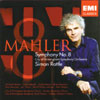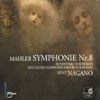Mahler Symphony No 8
A Mahler 8 that seems dutifully fervent against a euphoric Rattle and his forces
View record and artist detailsRecord and Artist Details
Composer or Director: Gustav Mahler
Genre:
Orchestral
Label: EMI
Magazine Review Date: 3/2005
Media Format: CD or Download
Media Runtime: 78
Mastering:
Stereo
DDD
Catalogue Number: 557945-2

Tracks:
| Composition | Artist Credit |
|---|---|
| Symphony No. 8, 'Symphony of a Thousand' |
Gustav Mahler, Composer
Birgit Remmert, Contralto (Female alto) Christine Brewer, Soprano City of Birmingham Symphony Orchestra City of Birmingham Symphony Orchestra Chorus City of Birmingham Symphony Youth Chorus David Wilson-Johnson, Baritone Gustav Mahler, Composer Jane Henschel, Contralto (Female alto) John Relyea, Bass Jon Villars, Tenor Juliane Banse, Soprano London Symphony Chorus (amateur) Simon Rattle, Conductor Soile Isokoski, Soprano Toronto Children's Choir |
Composer or Director: Gustav Mahler
Genre:
Orchestral
Label: Harmonia Mundi
Magazine Review Date: 3/2005
Media Format: CD or Download
Media Runtime: 88
Mastering:
Stereo
DDD
Catalogue Number: HMC901858/9

Tracks:
| Composition | Artist Credit |
|---|---|
| Symphony No. 8, 'Symphony of a Thousand' |
Gustav Mahler, Composer
Berlin Deutsches Symphony Orchestra Berlin Radio Chorus Detlef Roth, Baritone Elena Manistina, Contralto (Female alto) Gustav Mahler, Composer Jan-Hendrik Rootering, Bass Kent Nagano, Conductor Leipzig Radio Chorus Lynne Dawson, Soprano Robert Gambill, Tenor Sally Matthews, Soprano Sigurd Brauns, Organ Sophie Koch, Mezzo soprano Sylvia Greenberg, Soprano Windsbach Boys' Choir |
Author: Edward Seckerson
As is Mahler’s opening gambit. Not just the choice of text but the way in which he chooses to set it. ‘Veni, creator spiritus’ – ‘Come, creator spirit’ – which might just as well read ‘come, creative spirit’. Because come it does in the white heat of inspiration. This opening alone polarises the two performances under discussion. Kent Nagano’s opening bars are monumental, far-flung, a clean, open, sonorous sound. But it is Rattle (recorded live) who gives us the thrust, the lift-off, an immediate sense of the imperative. Never let it be forgotten (because Nagano appears to do just that) that this is a classic symphonic allegro. The voices should be perceived as merely an extension of the orchestral forces. The arrival of the second subject group (‘Imple superna gratia’) brings on the solo voices led, in the Rattle, by the luminous Christine Brewer. Nagano’s Sylvia Greenberg is no match, indeed horribly flat in pitch throughout the latter part of this beautiful episode. Nor is the harmonic blend very satisfactory, with Nagano’s tenor, Robert Gambill, finding undue prominence. But it’s in the driving tuttis – not least the great push of the central development – that Rattle achieves and maintains such thrilling impetus. The immediacy of the EMI balance – in marked contrast to the impressive but more diffuse HM sound – contributes greatly to this impression. Rattle’s choruses are not just weighty but bright and punchy, the children’s voices cutting through the texture excitingly (hollering, I remember from the performance, through cupped hands), his two sopranos (Brewer and Soile Isokoski) peaking above the stave in a way that Nagano’s lighter choice of voices (Greenberg and Lynne Dawson) do not.
Both conductors make a meal of the recapitulation, the mighty return of the opening invocation (replete with unwritten ritardando), but Rattle makes you feel it’s been earned. There is at all times a musical logic to his reading that plainly is lost on Nagano. He (Nagano) goes for massive expansion in the crowning ‘Gloria Patri Domino’ where Rattle hair-raisingly picks up on the jubilant fugal transition and almost recklessly presses forward, the overlapping choral entries going off like celestial comets. It’s the difference between the dutifully fervent and the euphoric.
And so it continues, Nagano eliciting our admiration rather than our involvement, Rattle quite the reverse. There is, frankly, no musical comparison. Where Nagano meanders, Rattle holds the score in a perpetual state of wonder. He totally buys into the innocence of all the celestial music in Part Two, keeping it airborne, animated – in seventh heaven, in fact. I don’t feel Nagano believes any of it. The entrance of the Mater gloriosa – afloat on a purple cloud of unison violins, harp and harmonium – may be marked adagissimo but Nagano reads that as impossibly slow. The melody becomes almost indiscernible. With Rattle it’s positively seraphic.
From a purely technical point of view, Nagano’s DSO, Berlin (the other Berlin orchestra – now there’s an irony) probably has the edge over Rattle’s CBSO but how little that means when weighed against the spirit that governs it. Rattle’s soloists are significantly better, too, with a notably better deal from the engineers. I certainly prefer Rattle’s choice of a Heldentenor – Jon Villars – for Doctor Marianus over Nagano’s more lyric Gambill, singing (albeit prettily) much of the music in his head voice.
Let one final detail, though, suffice in demonstrating why Rattle’s Mahler Eighth is arguably the best we have had since Solti’s sensationally recorded Decca account. It has to do with the point I made at the start of this review. In the final minutes, Goethe’s Gretchen – in the figure of Una Poenitentium (Dawson for Nagano, Isokoski for Rattle – both a little stretched in this solo) – sings a short phrase to the words ‘My former loved one’. That same phrase is given supreme significance at the climax of the final ‘Chorus mysticus’, thundered out by horns and trombones. Nothing could be clearer to me than that the love between two people, however seemingly insignificant, meant more to Goethe, the humanist, and to Mahler, his disciple, than anything. Nagano, bizarrely, moves this moment on; Rattle gives it its full due. I rest my case.
Discover the world's largest classical music catalogue with Presto Music.

Gramophone Digital Club
- Digital Edition
- Digital Archive
- Reviews Database
- Full website access
From £8.75 / month
Subscribe
Gramophone Full Club
- Print Edition
- Digital Edition
- Digital Archive
- Reviews Database
- Full website access
From £11.00 / month
Subscribe
If you are a library, university or other organisation that would be interested in an institutional subscription to Gramophone please click here for further information.




